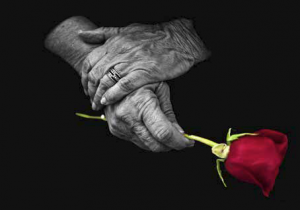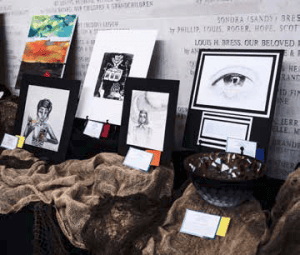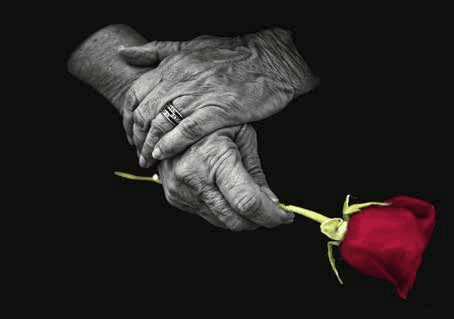This year’s Yom Hashoah Commemoration, honoring the victims and survivors of the Holocaust, as well as liberators and righteous gentiles, brought the community together around not just awareness and sadness, but honor and hope for the future. Yom Hashoah co-chair Elka Mednick, says, “This event reminds us that we must “never forget,” and we must continue to act bravely in the face of injustice, hatred, and closed mindedness, particularly in our current state of affairs.”
Congregation Beth El hosted the annual event this year. After Ohef Sholom Temple’s Cantor Jennifer Reuben beautifully sang the American and Israeli national anthems, Rabbi Sender Haber of B’nai Israel challenged those assembled with his D’Var Torah. Haber reflected on his grandfather’s experiences studying Torah in Lithuania in the years leading up to the Holocaust, to offer a reason for God to have faith in us again.
Lisa Bertini, Holocaust Commission chair, greeted more than 400 attendees, referencing the story they would hear from the guest speaker about his father’s exploits as a partisan commander in Northern Italy. Bertini’s mother grew up in Fiume, Italy, and still recalls the terror of living under occupation, and as a Catholic, always feeling like she had not been “brave enough.” With her thoughts on the current climate of incivility gripping our own nation, referencing the rise in antisemitic rhetoric and other hate speech in America today, Bertini charged those assembled with the hope that “we would always be brave enough.”
 The future of the U.S. democracy was beautifully represented by the winners of the 2018 Elie Wiesel Writing and Visual Arts Competitions for Students sponsored by the Simon Family Foundation and Towne Bank. This year saw more than 1,000 entrants from 41 schools from eight states. Winners came from 16 different schools, and senior poetry winner Taylor Maloney from Tallwood High School read her winning poem, All Sides.
The future of the U.S. democracy was beautifully represented by the winners of the 2018 Elie Wiesel Writing and Visual Arts Competitions for Students sponsored by the Simon Family Foundation and Towne Bank. This year saw more than 1,000 entrants from 41 schools from eight states. Winners came from 16 different schools, and senior poetry winner Taylor Maloney from Tallwood High School read her winning poem, All Sides.
Two recipients of the commission’s Awards for Excellence in Holocaust Education were recognized for their years of dedication to helping students understand the relevance and critical lessons of the Holocaust. Lauren Goldman Barkan, co-chair of the Educator Awards, presented this year’s honors. The Esther Goldman Award, in memory of Barkan’s grandmother, went to Maria Faircloth of Frank W. Cox High School in Virginia Beach, and the Ruthi Sherman Kroskin Award, named for the late Commission member who embodied the spirit of the Holocaust Commission, went to Ashley Mansell of Great Bridge Middle School.
The evening’s guest speaker was Dr. Mark Wygoda, who shared his father Hermann Wygoda’s story of loss and heroism during the Holocaust. With a few family photos, Wygoda told of his half-brother Samuel, left in the care of others, who was ultimately deported to his death at Treblinka with his grandmother and other relatives. With no family left, his father Hermann “went underground,” hiding his Judaism in plain sight. Acting as a smuggler into various Polish ghettos, and eventually taking an engineering job for a German company, Hermann’s perfect German accent and a friend’s forging skills protected his identity. The younger Wygoda told of his father’s eventual escape to northern Italy, where he was convinced to become the leader of a band of partisans based in the mountains outside Savona. Eventually he became known as “Comandante Enrico,” and from his command post in a cave in the mountains, led raids, conducted prisoner exchanges, and eventually was involved in the liberation of Savona. One of 10 Italian partisans awarded the Bronze Star in 1946 by the United States Army, Wygoda used this as an impetus to move to the United States and remade his life. Dr. Wygoda turned his father’s wartime journals, which Hermann translated from Polish to English in the 1950s, into the harrowing memoir, In the Shadow of the Swastika.
The lighting of memorial candles changed this year, as the Commission sought to make it easier for survivors as they are aging, yet hold onto the solemnity of recognizing them for their losses and resilience. Elka Mednick lit six candles symbolizing not only the six million Jewish victims of the Nazis, but also the 1.5 million Jewish children murdered, Liberators, Rescuers, those survivors this community has lost, those survivors still alive, and the educators who work hard to keep the lessons of the Holocaust in the minds of the next generation. As survivors’ names were read, Lei Lei Berz on cello and her daughter Lily on violin, played contemplative music which supported the mood of the sanctuary.
 Cantor Elihu Flax of Beth Sholom Home led the K’El Malei Rachamim memorial prayer, and Rabbis Israel Zoberman and Rosalin Mandelberg shared the Kaddish infused with the names of some of the Nazis’ worst concentration camps.
Cantor Elihu Flax of Beth Sholom Home led the K’El Malei Rachamim memorial prayer, and Rabbis Israel Zoberman and Rosalin Mandelberg shared the Kaddish infused with the names of some of the Nazis’ worst concentration camps.
Sandra Leon, Holocaust Commission and UJFT board member, could not help getting emotional as she closed the evening with words from the Yizkor memorial prayer, thinking about the losses in Tidewater’s survivor community in the decades since she had closed a Yom Hashoah event. As attendees quietly exited, they were offered special Yom Hashoah yahrzeit candles from the Association of Men’s Clubs to light at home in memory of the six million. The six candles on the bima continued to burn in honor and memory, urging everyone to never forget.
At the night’s conclusion, event co-chair Paula Alperin, who had chaired the event more than 20 years ago, remarked, “As the years have passed and our beloved survivors have “come of age,” we have glimpsed the future. The Holocaust Commission fully appreciates its responsibility to carry on the messages of tolerance, justice, and moral courage through Holocaust education into this millennium and beyond. It has been my privilege to be associated, over the years, with such a group of talented, dedicated, and committed people.”
Visit and like the Holocaust Commission Facebook page to see more photos from Yom Hashoah: www.fb.com/holcommission. Photography by Mark Robbins.
– Elena Barr Baum

